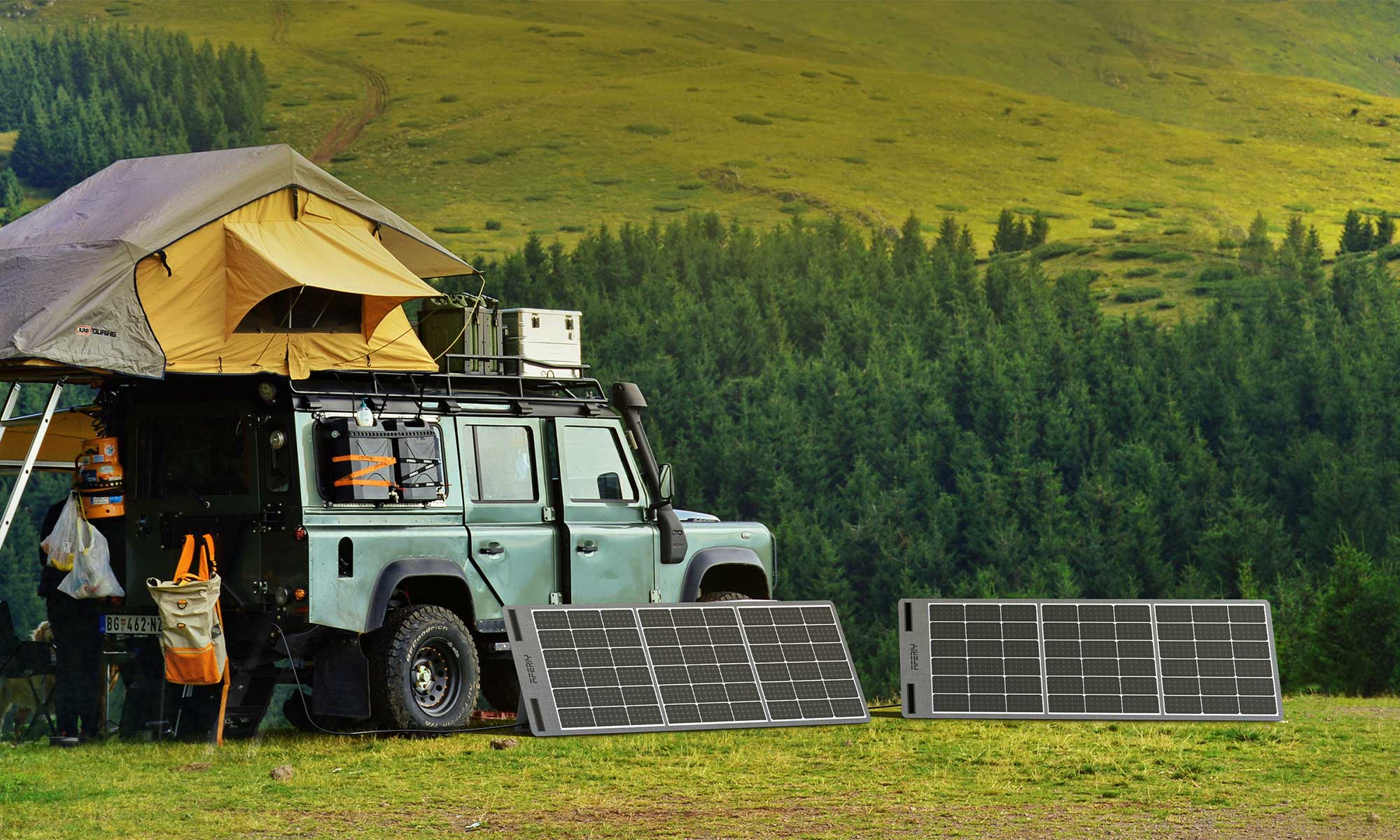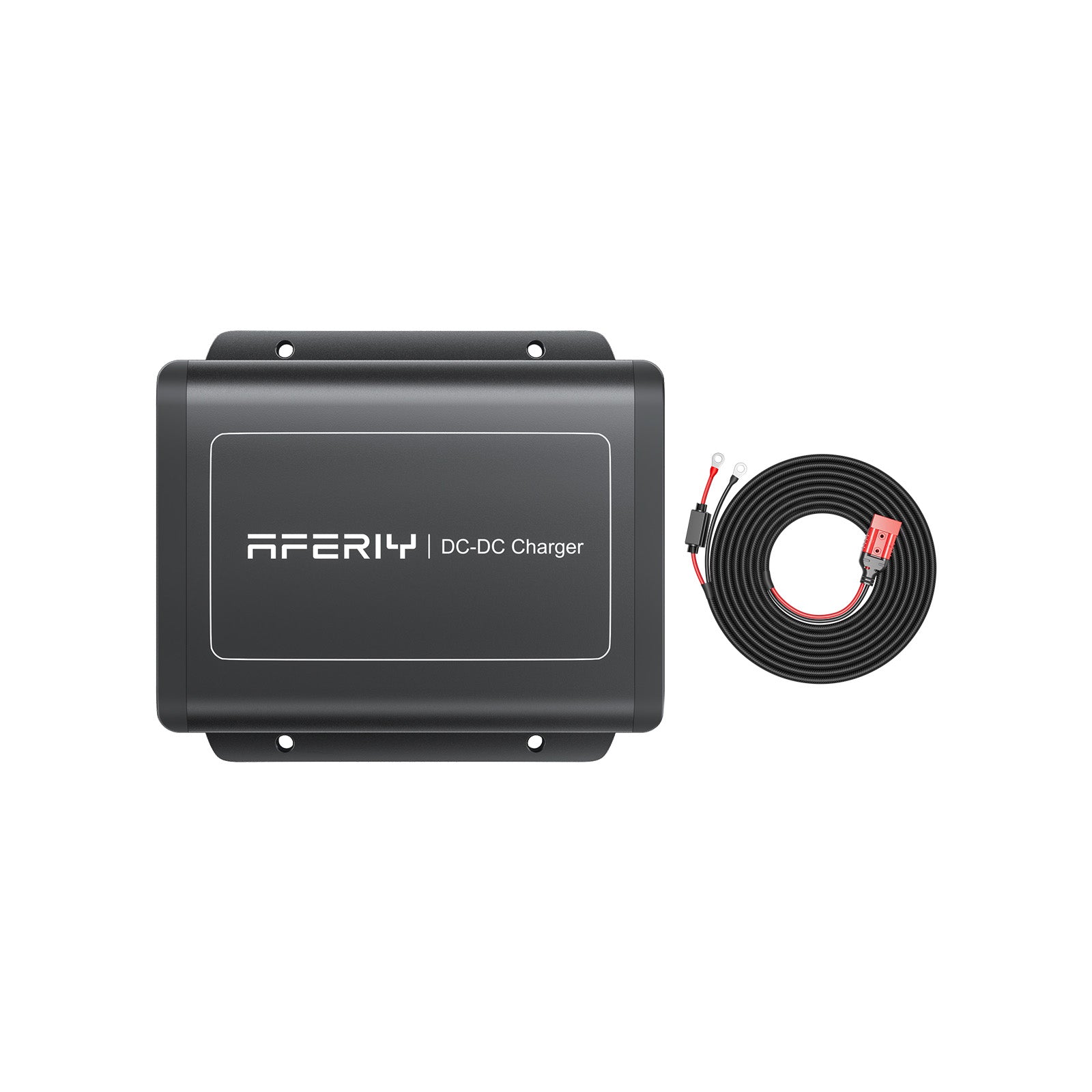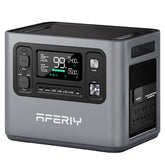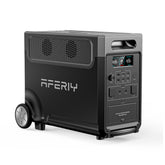How to Find the Best Solar Panels for Camper Vans?
Solar panels for camper vans harness the sun's power, providing clean, renewable energy. This reduces the reliance on fossil fuels and cuts down on pollution, making van life more eco-friendly. Portable solar panels are an excellent choice for energy on the go. To ensure they are suitable, you need to consider various factors, including the compatibility with a solar power generator, the availability of a solar panel extension cable, and the option of a foldable solar panel for added convenience. This ensures they work well for camper van enthusiasts and can be integrated with a power station for optimal performance.

Why Solar Panels are Important for Camper Vans
Solar panels give camper vans a green power source. They cut down on using fossil fuels, making travel better for the planet. With solar panels, van owners can live off-grid. This means they can explore faraway places without worrying about power.
Solar panels keep van batteries full. This helps important things like lights and fridges work well. Monocrystalline panels work even when it's cloudy, so they're good for all weather. Rigid solar panels are strong and last long, which is great for tough trips.
Using solar panels lowers carbon footprints. Green travel helps protect nature. Van fans can enjoy the outdoors while caring for it too. Solar panels are cheap and easy to put in, so many people can use them.
Even when not traveling, solar panels keep batteries ready for the next trip. You can choose different sizes from 100W to 300W based on your needs.
Solar panels are a smart choice for all camper vans because of their many perks. These include saving money, being eco-friendly, and giving energy freedom. Solar panels make van life better with clean and steady power.

Benefits of Using Solar Panels in Camper Vans
Energy Independence
Off-Grid Capabilities
Solar panels let camper vans live off-grid. This means van owners can visit far places without power worries. Monocrystalline panels work even on cloudy days, giving steady energy. Rigid solar panels are strong and good for rough trips.
Cost Savings
Using solar panels saves money. They cut down the need for fuel generators, lowering fuel costs. The first cost of solar panels pays off over time with lower energy bills. Solar panels also keep batteries healthy, so you don't need new ones often.
Environmental Impact
Reduction in Carbon Footprint
Solar panels help reduce carbon footprints. They use renewable energy, so vans need less fossil fuel. This cuts greenhouse gases and fights climate change. Solar panels give clean energy, making travel eco-friendly.
Sustainable Travel
Solar panels support green travel by giving a clean power source. Van owners can enjoy nature and protect it too. Solar energy is endless and perfect for long trips. Solar panels make sure camper vans have steady and green power.
Types of Solar Panels for Camper Vans
Picking the right solar panel for a camper van is important. Each type has its own pros and cons. Knowing these helps you choose better.
Monocrystalline Solar Panels
Monocrystalline Solar Panels are very efficient and last long. They use one crystal structure, which helps make more electricity. These panels work well even when it's not sunny, but they cost the most.
Polycrystalline Solar Panels
Polycrystalline Solar Panels have many crystal structures. They are less efficient than monocrystalline panels but cheaper. People who want to save money might like them. They still give enough power for basic needs.
Flexible Solar Panels
Flexible Solar Panels can bend around curved roofs. You can glue them on with Sikaflex adhesive. They work as well as rigid panels but cost more. Flexible panels are good if you want a low-profile look.
Rigid Solar Panels
Rigid solar panels are strong and last a long time. They handle tough conditions well, making them great for rough trips. These panels usually have high wattages, giving lots of power for appliances.
Foldable Solar Panels
Foldable Solar Panels are easy to carry and store. You can set them up or take them down quickly, perfect for short uses. Van owners can use foldable panels to charge batteries or run small gadgets during stops.
Comparing the Types
-
Efficiency: Monocrystalline panels are best, then polycrystalline and flexible.
-
Cost: Polycrystalline panels cost the least; monocrystalline and flexible cost more.
-
Durability: Rigid panels are toughest; flexible ones balance toughness and bending.
-
Portability: Foldable solar panels are easiest to move, great for quick setups.
Choosing depends on what you need and like best. Think about your budget, space, and energy needs. Each type has special benefits so everyone can find a good fit.
Factors to Think About When Picking Solar Panels for Camper Vans
Power and Energy Needs
To pick the right solar panel, know your power needs. Camper vans need energy for things like lights and fridges. Monocrystalline panels are very good at making power. They are great if you need a lot of energy. Polycrystalline panels are cheaper but make less electricity.
Think about how much wattage you use each day. A 100W to 200W panel can charge batteries and run small stuff. For bigger setups, you might need a 300W panel. Always match the solar panel's power with what your van uses.

Size and Weight
Size and weight matter when picking solar panels for camper vans. Rigid panels are heavy and big. Flexible panels are light and can bend around curves. Thin-film panels are also light but need more space because they aren't as efficient.
Measure your van's roof space first. Make sure the panel fits without blocking other parts. Lighter panels help save fuel and make driving easier.

Durability and Weather Resistance
Durability and weather resistance are key factors too. Rigid panels do well in tough conditions, so they're good for rough trips. Flexible panels handle small bumps but may not last as long. Thin-film panels are durable but don't work well in bad weather.
Pick panels that can handle different weather types. Look for waterproofing and UV protection features. Durable solar panels last longer and cost less to maintain.

Installation and Mounting Options
Putting solar panels on camper vans right helps them work best. Different panels need different ways to be installed.
Rigid Solar Panels
Rigid solar panels are strong and work well. They need a solid mount. Use aluminum brackets and steel bolts to fix them on the van's roof. This setup handles bad weather. Rigid panels give steady power for long trips.
Flexible Solar Panels
Flexible solar panels fit curved roofs. Use glue like Sikaflex to stick them on. They are light, so they don't add much weight to the van. Flexible panels look smooth with the van's design, giving a neat look.
Thin-Film Solar Panels
Thin-film solar panels are light and easy to put up. Glue them straight onto the roof. They need more space because they make less power, but they bend easily for odd surfaces. These panels are cheap for basic energy needs.
Foldable Solar Panels
Foldable solar panels are easy to move and use. You don't have to install them forever. Set them up when you stop and pack them away when driving again. They are good for short-term power needs like charging batteries or small gadgets.
Installation Process
The steps depend on the panel type but here’s a general guide:
-
Measure Roof Space: Check how much space is on the roof.
-
Choose Mounting System: Pick brackets, glue, or other tools.
-
Prepare Surface: Clean the roof so things stick well.
-
Install Panels: Fix the panels with bolts, brackets, or glue.
-
Connect Wiring: Hook up the wires to the charge controller and battery.
DIY vs Professional Installation
You can do it yourself (DIY) or hire a pro:
-
DIY Installation: Good if you know some basics; it's cheaper but needs care.
-
Professional Installation: Pros do it right and make sure it works well; costs more but is reliable.
Required Tools and Equipment
You'll need these tools:
-
Drill
-
Screwdrivers
-
Wrenches
-
Glue (for flexible/thin-film)
-
Brackets/bolts
-
Wiring kits
-
Charge controller
Maintenance Tips
Keep your solar panels in good shape:
Cleaning and Upkeep
Clean off dirt regularly with soft cloths and mild soap; no scratching stuff!
Troubleshooting Common Issues
Watch for problems in performance; check wires/connections often; replace broken parts quickly.
Follow these tips for reliable, green energy in your camper van!
Top Solar Panels for Camper Vans
AFERIY 400W Solar Panel
Specifications, Pros, and Cons
Specifications:
-
Power Output: 400 watts
-
Type: Monocrystalline
-
Dimensions: 64.5 x 39 x 1.4 inches
-
Weight: 41 lbs
-
Efficiency: 21%
-
Durability: Weather-resistant and strong
Pros:
-
High power supports many devices.
-
Works well even in low light.
-
Strong build handles tough weather.
-
Fits different mounting ways.
-
Great for long off-grid trips.
Cons:
-
Heavier and bigger than smaller panels.
-
Costs more at first.
-
Might need a pro to install due to size.
Learn more about AFERIY 400W portable foldable solar panel.

AFERIY 200W Solar Panel
Specifications, Pros, and Cons
Specifications:
-
Power Output: 200 watts
-
Type: Monocrystalline
-
Dimensions: 58.3 x 26.4 x 1.4 inches
-
Weight: 26 lbs
-
Efficiency: 20%
-
Durability: Weather-resistant and strong
Pros:
-
Good power for medium needs.
-
Works well in all weather.
-
Lighter and easier to set up than the 400W panel.
-
Cheaper for budget buyers.
-
Works with solar generators and stations.
Cons:
-
Less power than the 400W panel.
-
Might not meet high energy needs.
-
Needs enough roof space to work well.
Learn more about AFERIY 200W portable foldable solar panel.

AFERIY 100W Solar Panel
Specifications, Pros, and Cons
Specifications:
-
Power Output: 100 watts
-
Type: Monocrystalline
-
Dimensions: 42.2 x 19.6 x 1.4 inches
-
Weight: 16.5 lbs
-
Efficiency:19%
-
Durability:Weather-resistant and strong
Pros:
-
Light and small design
-
Easy to set up; good for DIY fans
-
Cheap for basic needs
-
Great for charging batteries or small devices
-
Works with portable power stations
Cons:
-
Low power might not run all devices
-
Less good in low light than bigger panels
-
Needs extra panels for more energy
Learn more about AFERIY 100W portable foldable solar panel.

Installation and Maintenance
Installation Process
DIY vs Professional Installation
Putting solar panels on camper vans can be fun. Many van owners like to do it themselves (DIY). This saves money and feels good. But, DIY needs some basic electrical skills and tools.
Professional installation is easy but costs more. Experts make sure the panels are set up right and safely. This option ensures the best performance and long life for the solar panels.
Required Tools and Equipment
You need the right tools for a good installation. Here’s what you need:
-
Drill: To make holes in the roof.
-
Screwdrivers: To tighten screws and bolts.
-
Wrenches: For nuts and bolts.
-
Glue (for flexible/thin-film panels): Sikaflex glue works well.
-
Brackets and bolts: To mount rigid panels.
-
Wiring kits: To connect panels to the charge controller and battery.
-
Charge controller: To control power from panels to battery.
Maintenance Tips
Regular care keeps solar panels working well. Good maintenance makes them last longer.
Cleaning and Upkeep
Clean solar panels often to remove dirt. Use a soft cloth with mild soap. Don’t use rough materials that can scratch them. Clean panels work better and make more power.
Check for damage on the panels. Look at brackets and bolts to see if they are tight. Regular checks stop problems before they start, keeping everything running smoothly.
Troubleshooting Common Issues
Watch how well your solar panels work. If power drops, check wiring connections. Loose or rusty wires can cause trouble. Tighten loose connections or replace bad wires.
Look out for shadows on the panels from trees or buildings that block sunlight. Trim branches or move the van to a sunny spot if needed.
If problems continue, call an expert for help. They can find and fix tough issues. Regular care and quick fixes keep your solar panels in great shape, giving you steady power for your camper van.
AFERIY solar panels are great for camper vans. They give a steady and green power source. Van owners can live off-grid without worrying about energy. AFERIY panels come in different sizes to fit various needs.
The AFERIY 400W PV panel gives lots of power. It works well even when it's cloudy. The AFERIY 200W panel is easier to set up and good for medium needs. The AFERIY 100W panel is light and simple to install, perfect for basic needs.
Putting in and taking care of solar panels is important. Proper setup helps them make the most energy. Cleaning them often keeps them working well. Van owners should check wires and clear anything blocking the sun.
AFERIY solar panels are strong and work in tough weather. They give steady power all the time. You can install them yourself or hire a pro, based on your skills and money.
Conclusion
In short, AFERIY solar panels are a top pick for camper vans. They offer freedom from fuel and help the environment too. Van owners can travel green with reliable power using these panels.
AFERIY solar panels give camper vans reliable and green power. They come in different sizes, like the small 100W panel and the big 400W panel. Each one works well and lasts long, even in tough weather.
AFERIY solar panels help you live off-grid and cut down on pollution. They are easy to set up and take care of, so anyone can use them. If you want to travel without needing fuel, AFERIY panels are a great pick.
Think about how much power you need and your budget. Buying solar panels for camper vans means you'll have steady power and help the planet too.
Helpful Resources
























Leave a comment
Please note, comments need to be approved before they are published.